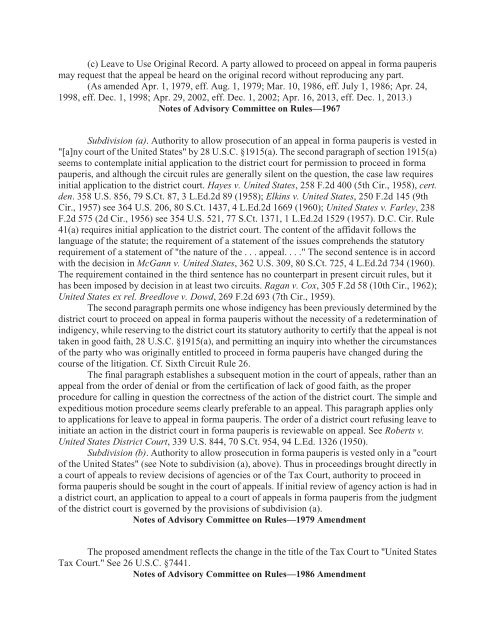Federal Rules of Appellate Procedure 2014-2015, 2014a
Federal Rules of Appellate Procedure 2014-2015, 2014a
Federal Rules of Appellate Procedure 2014-2015, 2014a
Create successful ePaper yourself
Turn your PDF publications into a flip-book with our unique Google optimized e-Paper software.
(c) Leave to Use Original Record. A party allowed to proceed on appeal in forma pauperis<br />
may request that the appeal be heard on the original record without reproducing any part.<br />
(As amended Apr. 1, 1979, eff. Aug. 1, 1979; Mar. 10, 1986, eff. July 1, 1986; Apr. 24,<br />
1998, eff. Dec. 1, 1998; Apr. 29, 2002, eff. Dec. 1, 2002; Apr. 16, 2013, eff. Dec. 1, 2013.)<br />
Notes <strong>of</strong> Advisory Committee on <strong>Rules</strong>—1967<br />
Subdivision (a). Authority to allow prosecution <strong>of</strong> an appeal in forma pauperis is vested in<br />
"[a]ny court <strong>of</strong> the United States" by 28 U.S.C. §1915(a). The second paragraph <strong>of</strong> section 1915(a)<br />
seems to contemplate initial application to the district court for permission to proceed in forma<br />
pauperis, and although the circuit rules are generally silent on the question, the case law requires<br />
initial application to the district court. Hayes v. United States, 258 F.2d 400 (5th Cir., 1958), cert.<br />
den. 358 U.S. 856, 79 S.Ct. 87, 3 L.Ed.2d 89 (1958); Elkins v. United States, 250 F.2d 145 (9th<br />
Cir., 1957) see 364 U.S. 206, 80 S.Ct. 1437, 4 L.Ed.2d 1669 (1960); United States v. Farley, 238<br />
F.2d 575 (2d Cir., 1956) see 354 U.S. 521, 77 S.Ct. 1371, 1 L.Ed.2d 1529 (1957). D.C. Cir. Rule<br />
41(a) requires initial application to the district court. The content <strong>of</strong> the affidavit follows the<br />
language <strong>of</strong> the statute; the requirement <strong>of</strong> a statement <strong>of</strong> the issues comprehends the statutory<br />
requirement <strong>of</strong> a statement <strong>of</strong> "the nature <strong>of</strong> the . . . appeal. . . ." The second sentence is in accord<br />
with the decision in McGann v. United States, 362 U.S. 309, 80 S.Ct. 725, 4 L.Ed.2d 734 (1960).<br />
The requirement contained in the third sentence has no counterpart in present circuit rules, but it<br />
has been imposed by decision in at least two circuits. Ragan v. Cox, 305 F.2d 58 (10th Cir., 1962);<br />
United States ex rel. Breedlove v. Dowd, 269 F.2d 693 (7th Cir., 1959).<br />
The second paragraph permits one whose indigency has been previously determined by the<br />
district court to proceed on appeal in forma pauperis without the necessity <strong>of</strong> a redetermination <strong>of</strong><br />
indigency, while reserving to the district court its statutory authority to certify that the appeal is not<br />
taken in good faith, 28 U.S.C. §1915(a), and permitting an inquiry into whether the circumstances<br />
<strong>of</strong> the party who was originally entitled to proceed in forma pauperis have changed during the<br />
course <strong>of</strong> the litigation. Cf. Sixth Circuit Rule 26.<br />
The final paragraph establishes a subsequent motion in the court <strong>of</strong> appeals, rather than an<br />
appeal from the order <strong>of</strong> denial or from the certification <strong>of</strong> lack <strong>of</strong> good faith, as the proper<br />
procedure for calling in question the correctness <strong>of</strong> the action <strong>of</strong> the district court. The simple and<br />
expeditious motion procedure seems clearly preferable to an appeal. This paragraph applies only<br />
to applications for leave to appeal in forma pauperis. The order <strong>of</strong> a district court refusing leave to<br />
initiate an action in the district court in forma pauperis is reviewable on appeal. See Roberts v.<br />
United States District Court, 339 U.S. 844, 70 S.Ct. 954, 94 L.Ed. 1326 (1950).<br />
Subdivision (b). Authority to allow prosecution in forma pauperis is vested only in a "court<br />
<strong>of</strong> the United States" (see Note to subdivision (a), above). Thus in proceedings brought directly in<br />
a court <strong>of</strong> appeals to review decisions <strong>of</strong> agencies or <strong>of</strong> the Tax Court, authority to proceed in<br />
forma pauperis should be sought in the court <strong>of</strong> appeals. If initial review <strong>of</strong> agency action is had in<br />
a district court, an application to appeal to a court <strong>of</strong> appeals in forma pauperis from the judgment<br />
<strong>of</strong> the district court is governed by the provisions <strong>of</strong> subdivision (a).<br />
Notes <strong>of</strong> Advisory Committee on <strong>Rules</strong>—1979 Amendment<br />
The proposed amendment reflects the change in the title <strong>of</strong> the Tax Court to "United States<br />
Tax Court." See 26 U.S.C. §7441.<br />
Notes <strong>of</strong> Advisory Committee on <strong>Rules</strong>—1986 Amendment


















